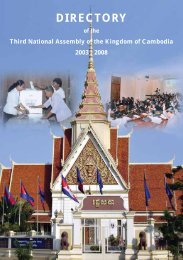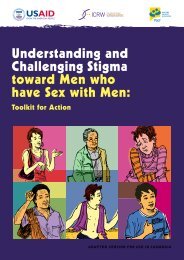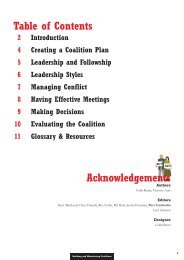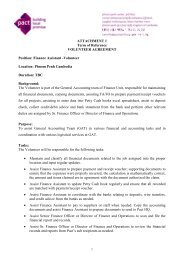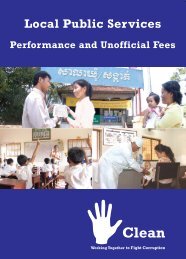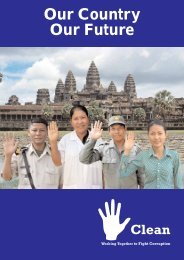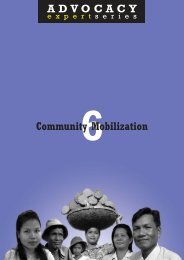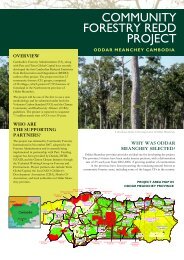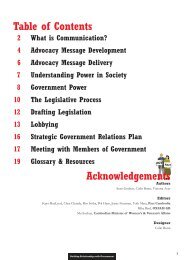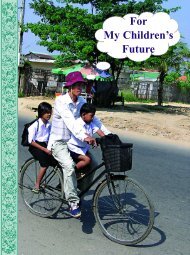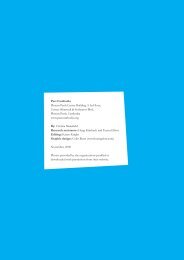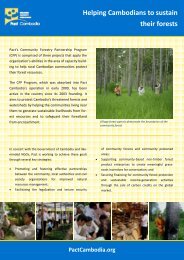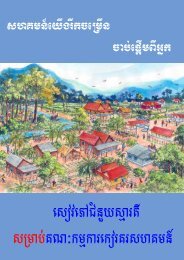Advocacy in Cambodia: Increasing Democratic ... - Pact Cambodia
Advocacy in Cambodia: Increasing Democratic ... - Pact Cambodia
Advocacy in Cambodia: Increasing Democratic ... - Pact Cambodia
You also want an ePaper? Increase the reach of your titles
YUMPU automatically turns print PDFs into web optimized ePapers that Google loves.
The CCEL campaign was the<br />
first opportunity for NGOs<br />
to work on a long-term issue<br />
that was not likely to reap<br />
immediate results. When<br />
asked how they kept their<br />
spirits up, EMOs <strong>in</strong>dicated<br />
that while it was sometimes<br />
difficult to keep themselves<br />
motivated, the prospect of<br />
real change and the<br />
knowledge that they were<br />
abid<strong>in</strong>g by the people’s will<br />
buoyed them.<br />
organizations were subject to. This was not<br />
adequately done <strong>in</strong> the CCEL campaign and<br />
as a result, when the advocacy strategy<br />
moved from <strong>in</strong>fluence to confrontation,<br />
some organizations withdrew, caus<strong>in</strong>g loss<br />
of momentum with<strong>in</strong> the movement. While<br />
it is not possible for organizations to always<br />
be <strong>in</strong> agreement, it is possible to identify<br />
po<strong>in</strong>ts at which views are likely to diverge<br />
<strong>in</strong> order to avoid loss of stakeholders at<br />
<strong>in</strong>opportune moments.<br />
Similarly, it was important for CCEL<br />
advocates to identify activities that needed<br />
to be done together and those that could be<br />
done apart. In an effort to ensure<br />
consensus, especially regard<strong>in</strong>g press<br />
releases, some processes <strong>in</strong> this advocacy<br />
campaign were probably too slow. Given the<br />
need to be able to dissem<strong>in</strong>ate <strong>in</strong>formation<br />
quickly, guidel<strong>in</strong>es need to be established<br />
so that time is not wasted build<strong>in</strong>g<br />
consensus when the situation does not<br />
require it, or when immediate action is<br />
needed.<br />
candidates.<br />
The average representation of women <strong>in</strong><br />
public <strong>in</strong>stitutions was only 7%. The real issue was<br />
to get women placed high enough on candidate<br />
lists so that they stood a fair chance to get on<br />
councils. In the end, 16.2% of all party commune<br />
council candidates were women, but they were<br />
placed low on candidate lists and therefore<br />
unlikely to get seats. One exception to this was the<br />
SRP, where 21.1% of candidates were women and<br />
these were well placed on the lists. FUNCIPEC had<br />
14% women candidates, who were not quite as well<br />
placed as the SRP female candidates. The CPP had<br />
13.27% women candidates, who were generally<br />
placed lower on the lists.<br />
Lessons Learned<br />
The CCEL campaign was the first<br />
opportunity for NGOs to work on a long-term<br />
issue that was not likely to reap immediate results.<br />
When asked how they kept their spirits up, EMOs<br />
<strong>in</strong>dicated that while it was sometimes difficult to<br />
keep themselves motivated, the prospect of real<br />
change and the knowledge that they were abid<strong>in</strong>g<br />
by the people’s will buoyed them.<br />
One important lesson learned was the need<br />
to understand the pressures and fears that various<br />
Future Considerations<br />
One of the challenges fac<strong>in</strong>g EMOs is<br />
the cyclical nature of their activities. In preelection<br />
and election periods, they receive<br />
considerable attention and fund<strong>in</strong>g and they<br />
implement many activities. In the <strong>in</strong>terval<br />
between elections however, fund<strong>in</strong>g dim<strong>in</strong>ishes<br />
significantly. In the future, it would behoove EMOs<br />
to learn how to function like real coalitions,<br />
draw<strong>in</strong>g on the resources of their members (staff,<br />
computers, cars, etc.) dur<strong>in</strong>g peak periods, and<br />
then releas<strong>in</strong>g resources back to their<br />
organizations dur<strong>in</strong>g slow periods.<br />
EMOs view the campaign to advocate for<br />
changes <strong>in</strong> the CCEL as hav<strong>in</strong>g just begun. They<br />
learned important lessons <strong>in</strong> their first advocacy<br />
attempt and will cont<strong>in</strong>ue to accumulate<br />
experience with every subsequent election. EMOs<br />
possess the stay<strong>in</strong>g power needed to achieve<br />
success <strong>in</strong> the long run. But while they consolidate<br />
their efforts, they must keep <strong>in</strong> m<strong>in</strong>d that the<br />
political context <strong>in</strong> <strong>Cambodia</strong> will cont<strong>in</strong>ue to<br />
change – particularly with the formation of 1,621<br />
communes. Their advocacy strategies will have to<br />
adjust to the chang<strong>in</strong>g landscape.<br />
References<br />
Cooperation Committee for <strong>Cambodia</strong>, 2001. NGO Statement to the<br />
2001 Consultative Group Meet<strong>in</strong>g On <strong>Cambodia</strong>. NGO Forum on<br />
<strong>Cambodia</strong>, MEDICAM, Phnom Penh, <strong>Cambodia</strong>.<br />
Election Monitor<strong>in</strong>g Organization annual reports.<br />
Case Studies<br />
73



